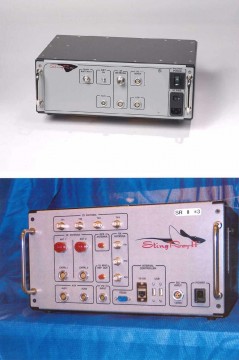Attorneys for long-time National Lawyers Guild legal observer Jerry Boyle filed suit in federal court today to challenge the sweeping use of “Stingray” cell phone spying devices by Chicago Police.
The suit, which aims to be certified as a class action, alleges that the stingray devices are frequently used without warrants or any official guidance, indiscriminately sweeping up cell phone data from innocent people, including attendees at political rallies, demonstrations and other 1st Amendment-protected activities.

Stingrays have the power to obtain identifying information about cell phones, access the content of phone calls and texts made on the phone, reveal website browsing histories, and track a phone’s cumulative movements.
According to the suit, “CPD owns and operates an arsenal of cell site simulators with these intrusive capabilities,” spending over a half million dollars between 2005 and 2010 to obtain them. The devices typically can access cell phones located more than a mile away from them, and capture data from up to 60,000 phones simultaneously.
The suit alleges that the Chicago Police Department’s use of cell site simulators “is secretive and widespread…and [CPD] has long refused to disclose information about its use of cell site simulators to the public and fought attempts to obtain such records in the courts, choosing to conceal its use of the technology.”
“The City does not even maintain any policies or procedures on what its officers may do with the personal information seized from thousands of individual cell phones without a warrant. The City has also, as a matter of practice, refused to train its officers about constitutional issues associated with officers’ use of cell site simulators. In addition, the City has maintained a widespread practice of permitting its police officers to deploy cell site simulators without a warrant specific to each phone that is searched in the process, and has frequently failed to obtain warrants even for the phone of the target in question.”
The suit cites as an example of the illegal surveillance a January 15, 2015 “Reclaim Martin Luther King, Jr. Day” demonstration organized by Black Lives Matter protesters at which Boyle’s and hundreds of others’ cell phones were illegally surveilled.
“The people of Chicago should be able to exercise their First Amendment rights to freedom of speech, association, and assembly without being spied upon by police,” said Boyle. “Government spying on its citizens without appropriate judicial oversight is inconsistent with the freedoms guaranteed by the Constitution.”
“The Chicago Police Department can’t give its officers weapons that have the power to search and seize our most personal information without any instructions about how to use them,” said Craig Futterman, a Clinical Professor of Law at the University of Chicago Law School and one of the lawyers representing Mr. Boyle. “That’s like giving officers guns and telling them to go get the bad guys, without even teaching them how to shoot. We’ve recently seen how this lack of surveillance oversight has played out at the NSA, where employees abused surveillance tools to spy on their spouses.”
“Any surveillance of political groups is particularly troubling,” said Matt Topic of Loevy & Loevy Attorneys at Law, another of Boyle’s attorneys, “but there is no dispute that even when CPD has a valid basis to track a legitimate suspect, the technology results in a search of every other phone in the area to find the suspect. This is a violation of the Fourth Amendment rights of hundreds, if not thousands, of innocent bystanders every time it is used.”
Defendants named in the suit include former Police Superintendent Garry McCarthy and current Superintendent Eddie Johnson.
Besides Futterman and Topic, Mr. Boyle is also represented by Mike Kanovitz, Ruth Brown and Josh Burday of Loevy & Loevy Attorneys at Law.
Loevy & Loevy is one of the nation’s largest civil rights law firms, and over the past decade has won more multi-million dollar jury verdicts than any other civil rights law firm in the entire country. Last November, Loevy & Loevy successfully obtained the release of the dashcam video of Laquan McDonald’s shooting death at the hands of Chicago police.
The University of Chicago Law School’s Civil Rights and Police Accountability Project is one of the nation’s leading civil rights clinics focusing on issues of criminal justice. The mission of the Law School’s clinical programs is to teach students effective advocacy skills, professional ethics, and the effect of legal institutions on the poor; to examine and apply legal theory while serving as advocates for people typically denied access to justice; and to reform legal education and the legal system to be more responsive to the interests of the poor.
For further reading see:
Cell Phone Surveillance at Peaceful Protest Draws Lawsuit Against Chicago Police

